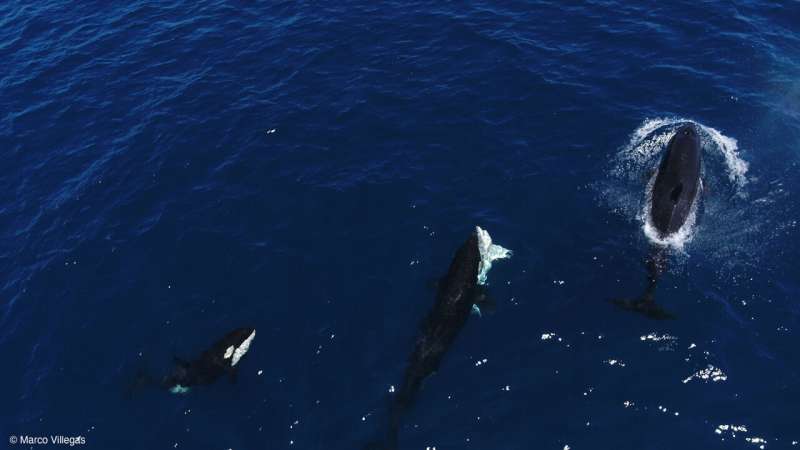Science
Orcas Target Young Great White Sharks in Gulf of California

A specialized group of orcas, known as Moctezuma’s pod, has been observed hunting young great white sharks in the Gulf of California. These orcas have developed a unique hunting technique that involves flipping the sharks upside down, allowing them to access the nutrient-rich liver, an essential part of their diet. The recent findings indicate that orcas may be targeting juvenile white sharks more frequently than previously understood.
The research, published in Frontiers in Marine Science, highlights two distinct hunting events, during which the orcas successfully killed three juvenile sharks. Marine biologist Erick Higuera Rivas, project director at Conexiones Terramar and Pelagic Life, noted that this behavior demonstrates the advanced intelligence and social learning capabilities of orcas. He stated, “Orcas that eat elasmobranchs—sharks and rays—could eat a great white shark if they wanted to, anywhere they went looking for one.”
During the first recorded hunt in August 2020, five orcas were seen pursuing a juvenile white shark. They worked together to turn it upside down, ultimately surfacing with the shark’s liver. A second hunt, observed in August 2022, followed a similar pattern, indicating a learned behavior within the pod.
Dr. Salvador Jorgensen, a co-author of the study from California State University, emphasized the significance of these observations. “This is the first time we are seeing orcas repeatedly target juvenile white sharks,” he remarked. Adult white sharks typically exhibit evasive behaviors when they detect orcas, often vacating their seasonal habitats for extended periods. In contrast, juveniles may not have developed the same instinctual responses, making them more vulnerable to predation.
The orcas’ technique of flipping the sharks induces a state known as tonic immobility, which temporarily paralyzes the shark and renders it defenseless. This method allows orcas to extract not only the liver but potentially other organs as well. According to Higuera, the ability to minimize the risk of being bitten during the hunt may be a factor in why they focus on juvenile sharks.
Changes in the distribution of white sharks in the Pacific may have provided Moctezuma’s pod with increased hunting opportunities. Climate events, such as El Niño, appear to have altered the nursery areas for white sharks, leading to their increased presence in the Gulf of California. As a result, each new cohort of juvenile sharks may become a seasonal target for the orcas.
Researchers plan to conduct further studies to clarify the dietary habits of this orca pod. They aim to determine whether the orcas regularly hunt white sharks or if they primarily target juveniles when available. Conducting this research poses challenges, as fieldwork is costly and orca hunting patterns can be unpredictable.
Dr. Francesca Pancaldi, a co-author from the Instituto Politécnico Nacional Centro Interdisciplinario de Ciencias Marinas, pointed out that the current observations may only scratch the surface of the orcas’ feeding behaviors. “So far, we have only observed this pod feeding on elasmobranchs,” she said. Understanding their feeding patterns is vital for identifying critical habitats, which can inform conservation efforts and management plans to mitigate human impact on these marine ecosystems.
As researchers continue to investigate, the interactions between orcas and juvenile white sharks will shed light on the complex dynamics of predator-prey relationships in the Gulf of California.
-

 Science2 weeks ago
Science2 weeks agoInventor Achieves Breakthrough with 2 Billion FPS Laser Video
-

 Top Stories3 weeks ago
Top Stories3 weeks agoCharlie Sheen’s New Romance: ‘Glowing’ with Younger Partner
-

 Business3 weeks ago
Business3 weeks agoTyler Technologies Set to Reveal Q3 Earnings on October 22
-

 Entertainment3 weeks ago
Entertainment3 weeks agoDua Lipa Aces GCSE Spanish, Sparks Super Bowl Buzz with Fans
-

 Health3 weeks ago
Health3 weeks agoCommunity Unites for 7th Annual Into the Light Walk for Mental Health
-

 Health3 weeks ago
Health3 weeks agoCurium Group, PeptiDream, and PDRadiopharma Launch Key Cancer Trial
-

 World3 weeks ago
World3 weeks agoR&B Icon D’Angelo Dies at 51, Leaving Lasting Legacy
-

 Entertainment3 weeks ago
Entertainment3 weeks agoRed Sox’s Bregman to Become Free Agent; Tigers Commit to Skubal
-

 Entertainment3 weeks ago
Entertainment3 weeks agoMother Fights to Reunite with Children After Kidnapping in New Drama
-

 Health3 weeks ago
Health3 weeks agoNorth Carolina’s Biotech Boom: Billions in New Investments
-

 Science3 weeks ago
Science3 weeks agoNorth Carolina’s Biotech Boom: Billions Invested in Manufacturing
-

 Top Stories3 weeks ago
Top Stories3 weeks agoDisney+ Launches Chilling Classic ‘Something Wicked’ Just in Time for October









